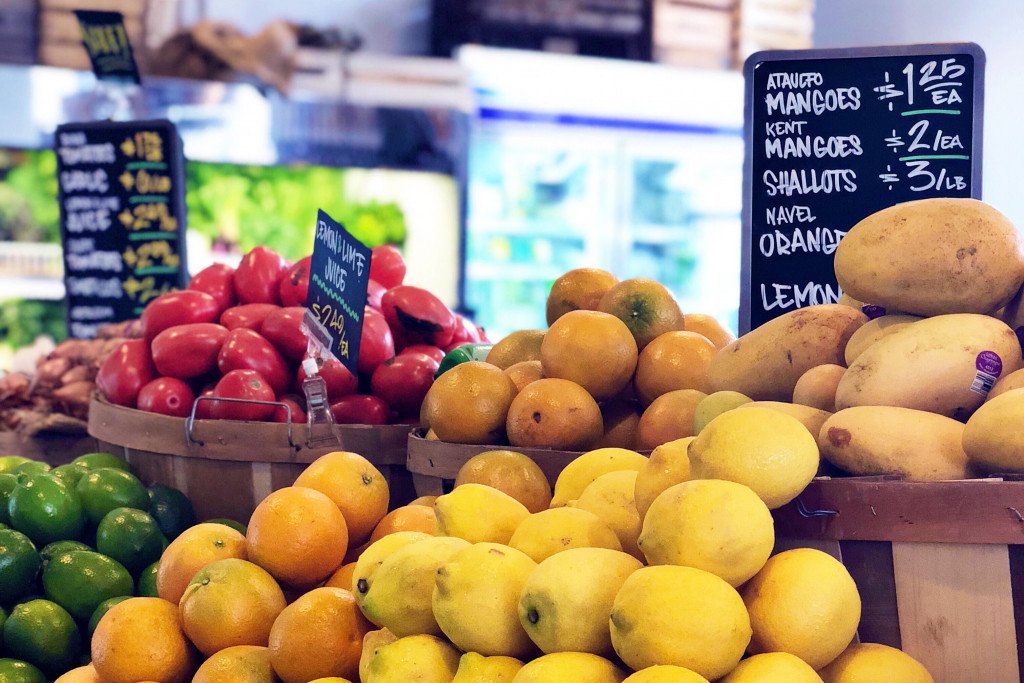12 Grocery Shopping Rules Nutritionists Follow to Save Money on Food
Healthy eating doesn't have to be expensive. Here's how you can cut costs.

Photograph by Caroline Cunningham
When shopping for healthy food, those $6 loaves of organic whole grain bread, $2 avocados, and $10 jars of coconut oil sure can make it seem like eating well has to be expensive. But the fact is, there are plenty of ways to save money on food — including fresh, nutritious food — that don’t require a ton of extra effort.
To find out how the pros make eating healthy foods affordable, we reached out to Philadelphia nutritionists for their tips. Here are some of the grocery shopping rules they live by.
Buy in Bulk, Then Freeze
Do it with produce: “If I get a good deal, I’ll get extra and put in my freezer. I chop up bananas, zucchini and berries to keep on hand for smoothies, for example.” —Registered dietitian Amy von Sydow Green
Do it with meat: “Buy organic meats in bulk. Once you get home, wrap into individual portions and freeze.” — Registered dietitian Melissa Bailey of The Philly Nutritionists
Shop for Plant-Based Meals
“Consider plant-based meals for the majority of your meals. Plant-based proteins such as tofu and beans are way less expensive than meat. Aim for five meals a week to be completely vegetarian and splurge a couple of nights a week on a nice piece of protein like fish, chicken, or beef.” — Registered dietitian Julie Lichtman of Sweat and Glow
Switch Up Your Grocery Stores
“I shop at a different super market each week, depending on what I need. [I buy] bulk foods at Whole Foods, specific Trader Joe’s items, normal groceries at Giant, other stuff at Wegman’s — so I load up on different items where they are cheapest depending on the store and week.” — Registered dietitian Kelly Strogen of Wayne Nutrition
Avoid Pre-Portioned Snack Packs
“If you can avoid the pre-portioned snacks, then do it and make your own! The food industry typically jacks up the price of those pre-portioned snacks due to the ‘convenience factor.’ If you have Ziploc bags and ten minutes you can just do it yourself.” — Registered dietitian Liz Smith of The Philly Nutritionists
Stick to the Essentials
“If you are truly eating healthy, the bulk of your grocery shopping should be lean meats, fruit, and vegetables — the essentials. If you are buying these ingredients plus sweet treats and junk food, you are likely spending more money. You end up spending more money on an ‘unhealthy’ diet.” — Registered dietitian Sheena Pradhan of Nutritious Balance
Avoid Single-Serve Yogurts
“I only buy bulk Greek yogurts, or sometimes smaller yogurt containers, but only when on sale (I load up).” — Registered dietitian Kelly Strogen of Wayne Nutrition
Ditch the Pre-Cut Veggies
“The pre-cut fruit and veggies are great for convenience, but you’re paying a price. Another thing about pre-cut fruit and veggies: They usually don’t last very long. I stay away from the ready-made zoodles, because they tend to go bad very quickly (often before I have time to prepare them). For ease and convenience, I’d rather go with frozen veggie noodles. I love (I’m pretty much obsessed, honestly!) the carrot noodles at Trader Joe’s.” — Registered dietitian Amy von Sydow Green
Opt for Seasonal Produce
“Seasonal produces is likely traveling less to get to your market and should therefore be cheaper. Added bonus: produce taste so much more delicious when in season.” — Registered dietitian Julie Lichtman of Sweat and Glow
Buy Canned or Frozen Fish, Instead of Fresh
“Salmon, herring, mackerel, and sardines are all great choices. They will give you your omega-3 fats for a low price. Frozen fish is also a great choice, and usually less expensive than the fresh one.” — Registered dietitian Amy von Sydow Green
Skip the Fancy Flour
“We all know white flour has very little nutritional value, so why not make the swap to coconut or almond flour? Although it can be expensive in health food stores, you can buy coconut or almonds in bulk and make your own. It’s simple, all you need is a food processor or blender. You can also use these ingredients to make coconut or almond milk.” — Registered dietitian Zoe Fienman of OnPoint Nutrition
Use Coupons
“I always search for coupons! Wegmans is great because you can go online and click the coupons, then when you enter your phone number at checkout those coupons are automatically applied.” — Registered dietitian Kelly Strogen of Wayne Nutrition
Hit Up Aldi
“Aldi is such a money saver! If you have one near you, I highly recommend stocking up on your staples there. The organic section is also top-notch. My weekly go-to items include produce, grains, nuts, some condiments, cheeses, veggie burgers, and frozen seafood. They are known for having ‘one-off’ items too, which are worth the trip alone! You never know what you might find.” — Registered dietitian Emily Pierce of OnPoint Nutrition
Like what you’re reading? Stay in touch with Be Well Philly—here’s how:
- Like Be Well Philly on Facebook
- Follow Be Well Philly on Instagram
- Get the Be Well Philly Newsletter
- Follow Be Well Philly on Twitter


